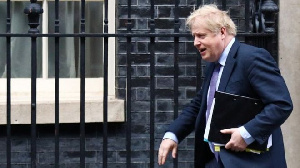
British Prime Minister, Boris Johnson
LONDON, July 1 (NN-AGENCIES) — The UK economy shrank more than first thought between January and March, contracting 2.2% in the joint largest fall since 1979, official figures show.
The Office for National Statistics (ONS) revised down its previous estimate of a 2% contraction, with all the main economic sectors dropping.
There was a significant economic impact in March, as the coronavirus pandemic began to have an effect.
Jonathan Athow, Deputy national statistician at the ONS, said: “Our more detailed picture of the economy in the first quarter showed GDP shrank a little more than first estimated.
Information from government showed health activities declined more than we previously showed.
All main sectors of the economy shrank significantly in March as the effects of the pandemic hit.
The first-quarter contraction is now the joint biggest drop since the July-to-September period in 1979.
Athow said: “The sharp fall in consumer spending at the end of March led to a notable increase in households’ savings.
The new data showed 6.9% GDP contraction in March.
The first-quarter figures show that the services sector – which accounts for about three-quarters of UK GDP – shrank by a record 2.3%.
The ONS said production output fell by a revised 1.5% in the three months, driven by declines in manufacturing as factories temporarily shut down, while there was a fall in construction output of 1.7%.
When compared with the same three-month period a year ago, the economy shrank by 1.7%, worse than the previous estimate of a 1.6% contraction.
But as the coronavirus lockdown only came into force on March 23, the second quarter will show the full hit on the economy.
Recent ONS monthly figures showed the economy plummeted by 20.4% in April – the largest drop in a single month since records began.
That contraction was three times greater than the decline seen during the whole of the 2008 to 2009 economic downturn.
Meanwhile, separate ONS data on the nation’s finances showed that Britain’s current account deficit widened by more than expected in the first quarter.
The balance of payments deficit – the difference between the value of the goods and services that a country imports and the goods and services it exports – rose to £21.1bn, or 3.8% of GDP. — NNN-AGENCIES






